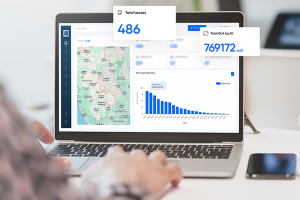Technological advancements have significantly transformed the leasing industry. From automation to comprehensive analytics, the latest trends have reshaped how businesses manage leases, optimize spaces, and enhance operational efficiency. Here are some of the key technological trends influencing the future of leasing.
1. AI and Machine Learning for Lease Optimization: Artificial intelligence (AI) and machine learning are becoming essential in lease management. These technologies enable businesses to analyze large volumes of lease data, forecast market trends, and enhance lease negotiations. Insights driven by AI can also aid in decision-making by uncovering opportunities for cost savings and highlighting potential risks.
2. Cloud-Based Lease Management Platforms: Cloud technology enhances lease administration by offering centralized access to lease documents, payment records, and compliance reports. These platforms foster better collaboration between landlords and tenants, facilitate smooth communication, and automate workflows.
3. Sustainable and Green Leasing Technologies: Sustainability has become a crucial element in leasing decisions. Factors such as green building certifications, energy-efficient designs, and smart energy management systems are shaping leasing trends. Technologies that promote sustainability help lower operational costs and appeal to environmentally conscious tenants.
4. Virtual and Augmented Reality for Property Viewing: Virtual Reality (VR) and Augmented Reality (AR) are transforming the way properties are presented. Potential tenants can explore office spaces through virtual tours, allowing them to make leasing decisions from afar without needing to visit in person. This approach is especially beneficial for businesses aiming to grow in various locations.
Key Leasing Trends to Watch in 2026
Commercial real estate is experiencing a major shift, influenced by changing tenant demands, the need for flexible space usage, and the integration of advanced technologies. Traditional long-term leases are replaced by more adaptable agreements responding to fluctuating market conditions. Presently, trends like mixed-use developments, smaller space requirements, and leasing flexibility are redefining lease management for the future. Let us know about these in detail.
1. Mixed-Use Spaces: These developments are on the rise as urban planners and developers aim to create lively communities that blend retail, office, residential, and healthcare facilities. These projects provide significant advantages for tenants by boosting foot traffic and convenience, but they also introduce challenges in lease management. Lease administrators need to develop agreements that address co-tenancy clauses, equitable rent structures, and shared cost models. Regular lease reviews and proactive lease management software can help protect tenant rights and adapt to changing tenant compositions.
2. Smaller Footprint Spaces: The demand for smaller, more efficient commercial spaces is increasing, driven by hybrid work models and evolving business needs. Companies are choosing compact, flexible spaces that fit their operational requirements. Lease agreements are adapting to include short-term leases, options for scaling, and detailed provisions for shared amenities. Smaller footprints in the retail and restaurant sectors enable design innovations such as pick-up windows and delivery kiosks, allowing brands to enter rapidly growing urban markets. While it can be challenging to maintain revenue with less space, creative pricing strategies and prime locations can help mitigate costs.
3. Flexibility and Adaptability: Flexibility has become a key concern for tenants, resulting in a growing demand for shorter leases, scalable options, and shared spaces. Lease agreements now include right-of-first-refusal clauses, subleasing options, and flexible structures to meet the changing needs of businesses. For instance, in the healthcare industry, leases need to adapt to rapid technological advancements, while retail businesses require lease terms that can accommodate omnichannel commerce. While this increased flexibility can complicate lease management, it also strengthens tenant relationships and boosts property resilience.
The Future of Lease Management: What’s Next
The future of lease management will depend on adaptability, strategic planning, and the integration of technology. By embracing trends such as mixed-use developments, smaller spaces, and flexible lease structures, businesses can remain competitive in the ever-changing commercial real estate market. Utilizing advanced lease management solutions will be essential for effectively navigating these shifts.
Stay ahead in lease management with CRE Lease Matrix – your solution for optimizing leases, ensuring compliance, and adapting to evolving trends. Transform your leasing strategy today! Book a demo now!






